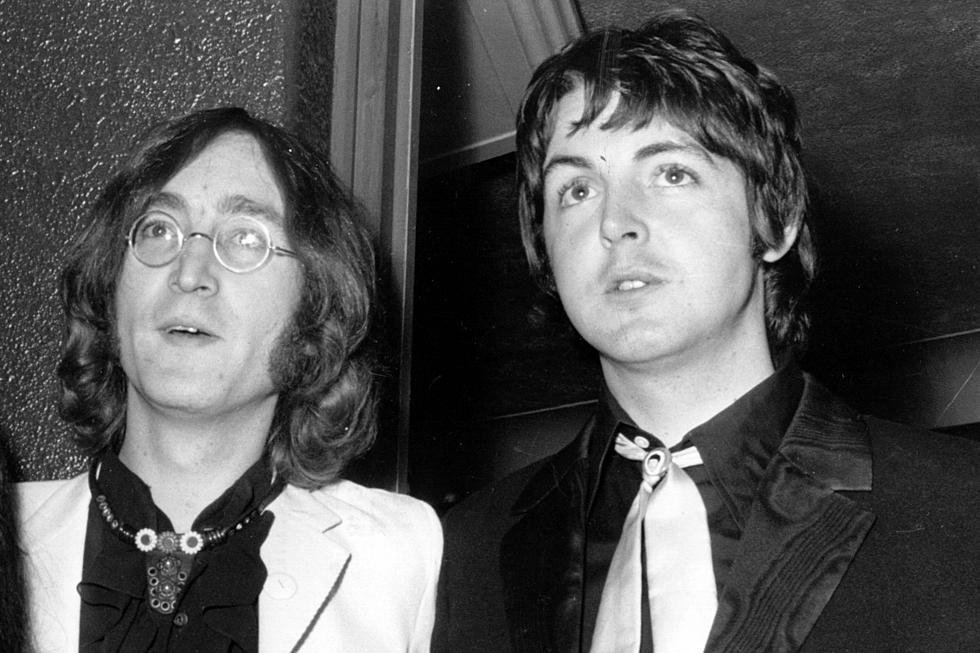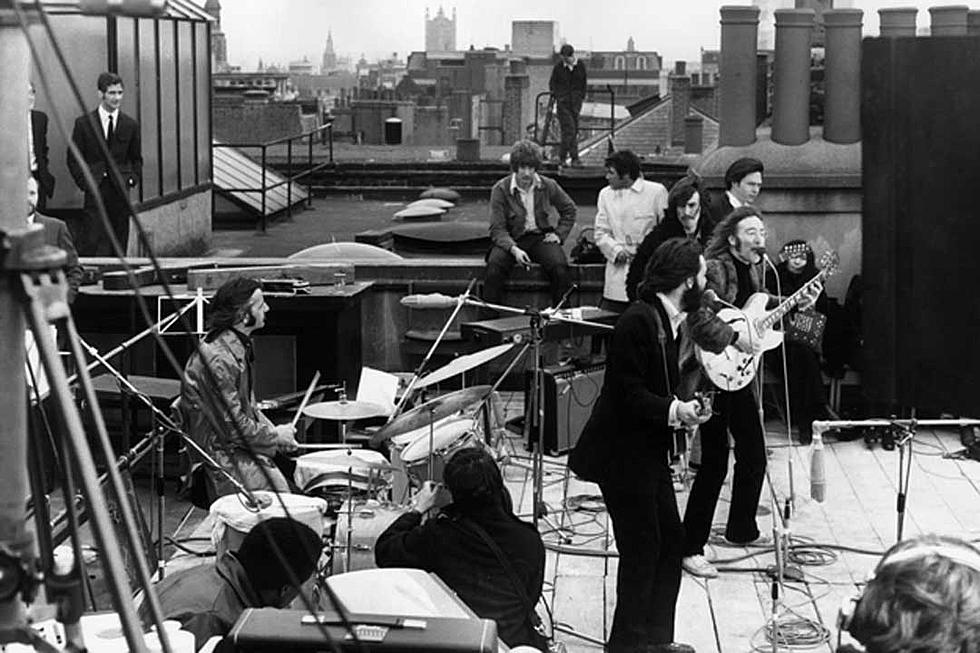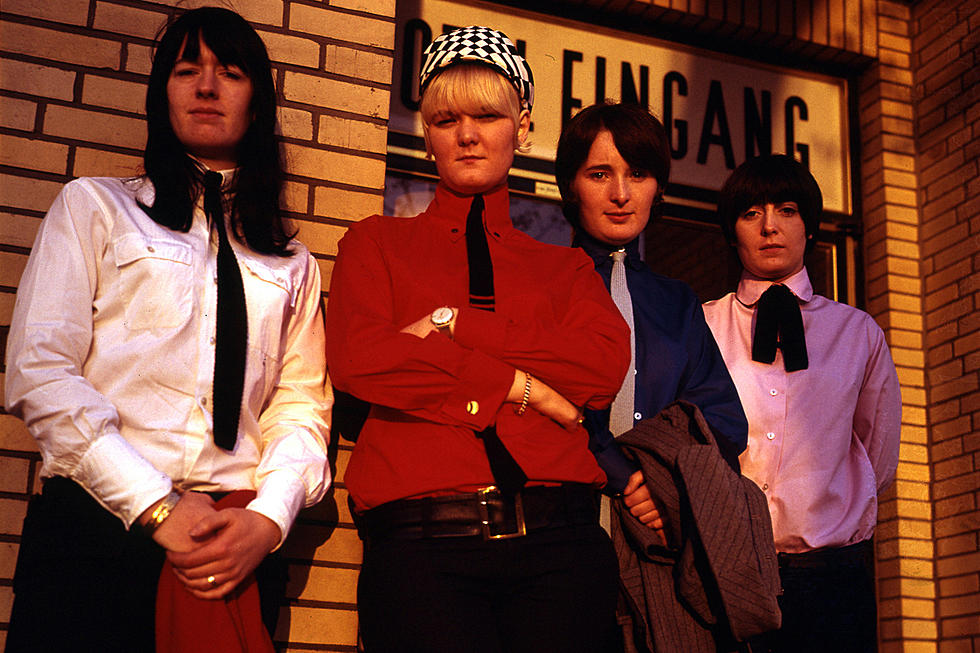
When the Beatles Got Their First No. 1 … Or Did They?
When Beatlemania took hold across Britain in 1963, the country’s media struggled with the reason for their rampant popularity. Was it their hair, their looks, their humor, or – perish the thought – their rambunctious brand of rock ’n’ roll? But no one pointed to the weather.
In January 1963, the U.K. was shivering through one of the most brutal winters in history, with record-breaking sub-zero temperatures and heavy bouts of precipitation. Just before, and on the day of, Jan. 19, the country was battered by chilling temps and snow showers, driving most British citizens to stay indoors for the night.
That evening happened to mark the first-ever national U.K. television appearance by a little-known group out of Liverpool. The Beatles popped up on ITV’s Thank Your Lucky Stars, miming to their just-released single “Please Please Me” before their biggest audience to date. Many teenagers and young adults, who might have otherwise been out, were instead at home on a Tuesday night, getting their first taste of the Fab Four: the sweet-and-sour wail of John Lennon’s harmonica, the band’s bouncy beat, those mop-top hairstyles, that energy.
Before “Please Please Me” had come out on Parlophone Records on Jan. 11, the Beatles had already recorded and released a debut single – “Love Me Do” – the previous fall. Although it made the pop charts, the song’s nationwide popularity was circumspect, given the quartet’s devoted fan base in Liverpool and the fact that manager Brian Epstein personally bought thousands of copies of “Love Me Do” to influence the chart tally.
“We’d had a Top 30 entry with ‘Love Me Do’ and we really thought we were on top of the world,” Lennon said in 1963, according to The Beatles Anthology. “Then came ‘Please Please Me’ – and wham! We tried to make it as simple as possible. Some of the stuff we’ve written in the past has been a bit way-out, but we aimed this one straight at the hit parade.” Although credited to the songwriting partnership of Lennon and bandmate Paul McCartney (billed as McCartney-Lennon, before it got switched), “Please Please Me” was wholly a Lennon composition, inspired by two of his singing heroes – Roy Orbison and Bing Crosby. As such, the singer and guitarist plotted it as a bluesy pop ballad (which may, or may not, have included a coded reference to oral sex – “Please please me ... like I please you.”)
Beatles producer George Martin was unimpressed. It had nothing to do with the supposed risque meaning but the tune’s languid pace. When the band presented the song to him at one of their earliest meetings, Martin dismissed it.
“At that stage ‘Please Please Me’ was a very dreary song,” the producer recalled in The Complete Beatles Recording Sessions. “It was like a Roy Orbison number, very slow, bluesy vocals. It was obvious to me that it badly needed pepping up. I told them to bring it in next time and we’d have another go at it.”
The band took Martin’s advice and returned with a more driving tempo for the song. By the time the Beatles recorded the final version of “Please Please Me,” with its overdubbed harmonica intro and escalating “come on” sequence, in November 1962 at EMI’s London Studios, Martin knew the group had created something special. He announced on the studio loudspeaker, “Gentlemen, I think you’ve got your first No. 1.”
His instincts would prove to be true ... mostly. “Please Please Me” not only became the band’s second single (backed by “Ask Me Why”), it served as the impetus for a new Lennon-McCartney publishing deal with Dick James (resulting in Northern Songs) and was the reason for the Beatles’ big national TV debut, when James played a pre-release copy of “Please Please Me” over the phone to the producer of Thank Your Lucky Stars.
Watch the Beatles Perform 'Please Please Me'
After the lads’ television performance on that cold, snowy night in January, the single began to climb the U.K. charts, reinforced by the Beatles’ rampant tour schedule. Their increasing profile upgraded the band to ballrooms, when they landed them a support spot on a tour with hit pop singer Helen Shapiro. The English tour began on Feb. 12, the day after the Beatles had recorded the bulk of their first album – also to be titled Please Please Me – in a marathon, one-day session. (Around that time, “Please Please Me” was released at the group’s first single in the U.S., though it flopped as was mistakenly credited to “the Beattles.”)
While on tour with Shapiro, the Beatles received a telegram from Epstein announcing that the Feb. 23 issue of the New Musical Express would have the band’s “Please Please Me” at No. 1 on the publication’s singles chart (sharing the top spot with easy-listening singer Frank Ifield’s “The Wayward Wind”). Legend has it that this reveal happened during a gig in Liverpool, prompting a wild reaction from the hometown fans.
By early March, “Please Please Me” held No. 1 outright on the NME chart and had also begun topping other U.K. charts, of which there were many. The Beatles’ second single topped the charts in Melody Maker, Disc, Pop Weekly, as well as the BBC’s Pick of the Pops, which sought to compile all the different British charts to create something of a “master” listing.
Lennon’s visions of the hit parade and Martin’s predictions of chart-topping seemed to come true. With “Please Please Me,” the Beatles had the No. 1 song on every chart – well, almost every chart. The lone holdout among the U.K. music industry tally-makers was Record Retailer, by whose count “Please Please Me” had never gotten above the No. 2 slot.
This was hardly a controversy at the time. Record Retailer hadn’t been publishing a singles chart for nearly as long as either NME or Melody Maker, and its chart didn't have the breadth of sample size as the others. For instance, in 1963, the NME and Melody Maker charts were sourced from more than 100 record stores, Disc’s reach was more than 50 stores and Record Retailers’ aggregate was compiled from about 30 locations. As such, it was considered a less-accurate indicator of sales by fans, musicians and executives.
But as the ’60s continued and the Beatles went from small-time pop sensations to global cultural trend-setters, Record Retailer’s importance also grew. In 1969, the industry magazine teamed with the BBC to begin producing an official chart for the entire U.K. with a survey from approximately 250 shops. This was seen as a significant, and necessary, advancement by the music industry. However, Record Retailer’s newfound prominence created some issues when its 1960-69 publications were adopted as the sole charts of record.
Some artists felt robbed of a previously held No. 1 status, as the Record Retailer chart often differed with its peers. The Rolling Stones’ “19th Nervous Breakdown” lost its chart-topping status, just like “Please Please Me” did. After 1969, as far as the history books were concerned, “From Me to You” had become the Beatles first No. 1 hit after being released by the band as their third single in April 1963.
Whether “Please Please Me” stalled at No. 2 or climbed to No. 1 might seem like a silly obsession for music nerds. The single’s chart position doesn’t change the song’s bottled excitement. It doesn't slander the attention it brought to the soon-to-be superstars. It doesn't alter the impression it made on British music fans in that nasty winter of 1963.
Yet the subsequent elevation of Record Retailer’s chart as an official measure has made a significant impact in at least one way. When the hits collection, 1, was put together in 2000, it contained “all 27 of the Beatles No. 1 hits.” Because of the downgraded status of “Please Please Me,” that song was not among them. And so, the tune that first launched Beatlemania is without a place on one of the best-selling albums in music history.
The Stories Behind Every Beatles LP Cover
Foreigner, Styx and Don Felder Share Beatles Memories
More From Cool 98.7 FM










